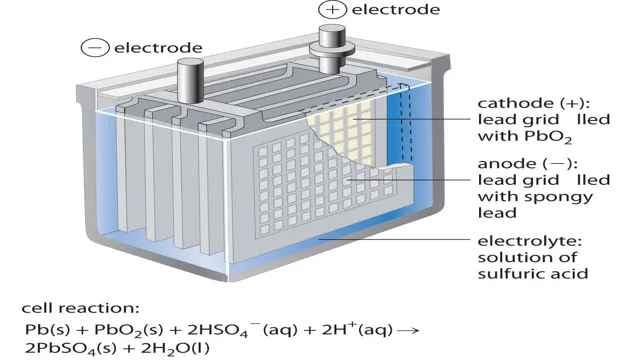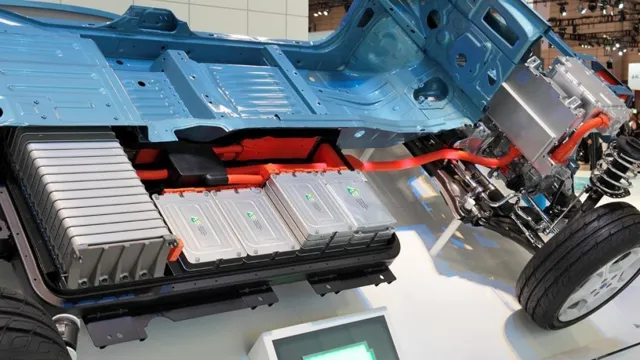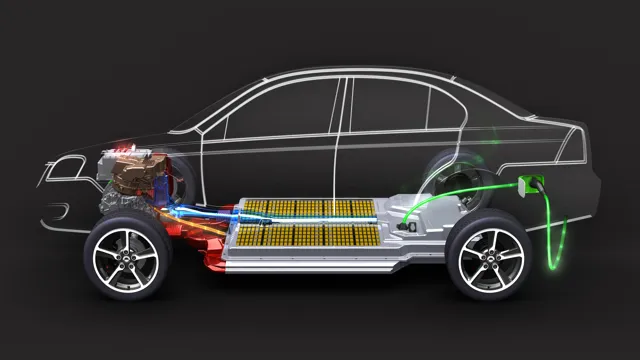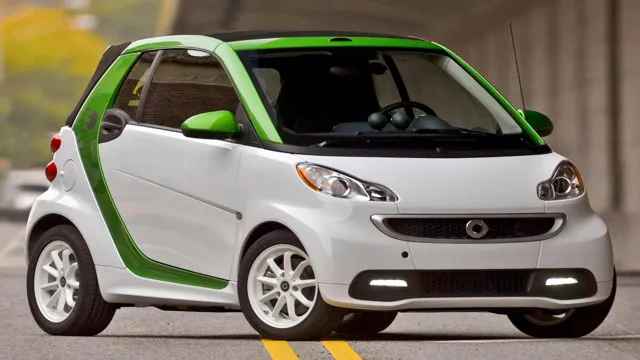Unleashing the Science: The Chemistry Behind Electric Car Batteries
In the current climate, electric cars are more popular than ever before. They’re environmentally friendly, cost-effective, and don’t require gasoline to run. But have you ever wondered what’s inside an electric car battery, and how it works? In this blog, we’re going to dive into the chemistry behind electric car batteries and how it enables them to power the vehicles of the future.
You don’t have to be a scientist to understand the processes that make electric cars tick. By the end of this blog, you’ll have a newfound appreciation for the technology that’s changing the world, one battery at a time. So, let’s get started!
How Do Electric Car Batteries Work?
Electric car batteries utilize a chemical reaction to power the vehicle. Specifically, they use lithium-ion technology – a type of rechargeable battery – which stores energy in a rechargeable battery pack. The batteries consist of modules, each containing cells made up of positive and negative electrodes and an electrolyte.
When the battery is charged, the lithium ions move from the positive electrode to the negative electrode, and when the energy is being used, they reverse this process by moving back to the positive electrode. The voltage produced by these chemical reactions powers the car’s electric motor, and the cycle repeats until the battery needs to be charged again. Lithium-ion batteries are advantageous in that they are lightweight, can store a lot of energy, and have a long lifespan compared to other types of batteries.
The Role of Electrolytes and Electrodes in Battery Chemistry
Electric car batteries rely on the interplay of several key components, including electrolytes and electrodes, in order to function. At the most basic level, electricity is generated through a process known as redox reactions, in which electrons are transferred between these components. This transfer creates a flow of electrical energy that drives the car’s motor.
The electrolyte is a solution that allows for the movement of ions between the electrodes and generates an electric charge to power the battery. Meanwhile, the electrodes serve as the source and sink for the electrons in the redox reactions that occur within the battery. In other words, the negative electrode (also known as the anode) is where the oxidation reaction takes place, while the positive electrode (or cathode) is where reduction occurs.
Understanding the role that these key components play in battery chemistry is essential for developing efficient, reliable electric cars. By optimizing the design and composition of these components, engineers can maximize the performance and longevity of electric car batteries, making them a viable and practical alternative to traditional gas-powered vehicles.
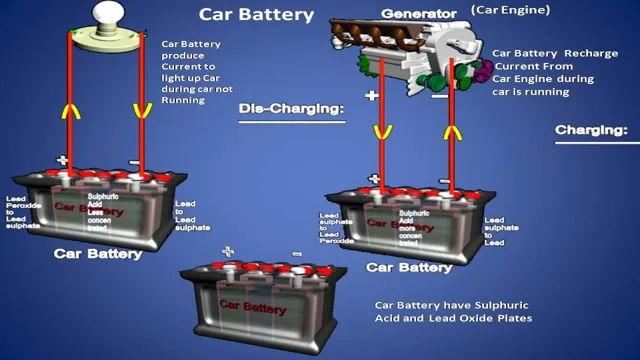
Types of Battery Chemistries Used in Electric Cars
When it comes to electric cars, the battery is one of the most vital components. It’s what gives the car the power it needs to run and determines factors like range, charging time, and weight. There are several types of battery chemistries used in electric cars, each with its own unique benefits and drawbacks.
One common type is lithium-ion, which is known for its high energy density and long lifespan. Another type is nickel-metal hydride, which is less expensive but also less energy-dense. Newer technologies like solid-state batteries are also being developed, which promise even greater energy density and faster charging times.
Regardless of the type, all electric car batteries work by using a chemical reaction to produce electrical energy that can power the car’s motor. As the car is driven and the battery discharges, the chemical reaction reverses, allowing the battery to be recharged for future use. Electric car batteries are constantly evolving and improving, making electric cars a more viable and reliable option for eco-conscious drivers.
Advantages of Lithium-Ion Batteries
When it comes to electric car battery chemistry, Lithium-Ion batteries are becoming increasingly popular due to their many advantages. One key advantage is their high energy density, which means they can store a lot of energy in a small and lightweight package. This makes Lithium-Ion batteries ideal for electric cars, as they enable longer driving ranges and reduce the overall weight of the vehicle.
Additionally, Lithium-Ion batteries have a long cycle life, meaning they can be charged and discharged repeatedly without significant degradation in performance. This is important for electric vehicles, as they require frequent charging. Furthermore, Lithium-Ion batteries are known for their fast charging capabilities, allowing for quick and convenient recharging times.
Overall, Lithium-Ion batteries offer a number of benefits for electric cars, making them a top choice for powering the vehicles of the future.
Energy Density: Why It’s Important
Energy density is a crucial factor to consider in batteries, and lithium-ion batteries have a clear advantage in this regard. Energy density refers to the amount of energy that can be stored in a given volume or mass, and it determines how much charge a battery can hold. Lithium-ion batteries have a high energy density, which means that they can store more energy in a smaller package.
This makes them an ideal choice for portable devices such as smartphones, laptops, and electric cars, where space is at a premium. With their high energy density, lithium-ion batteries provide long-lasting power in a compact and lightweight design. They also have a longer lifespan than many other battery types, making them a more cost-effective option in the long run.
So, if you’re looking for a reliable and efficient battery for your portable device or electric vehicle, lithium-ion batteries are definitely worth considering!
Safety Considerations in Lithium-Ion Battery Chemistry
Lithium-ion batteries have become increasingly popular in recent years due to their many advantages over other types of batteries. One of the main advantages is their high energy density, which allows them to store more energy in a smaller size. This makes them ideal for use in portable electronic devices like smartphones and laptops.
Another advantage is their long lifespan, as they can be recharged many times without losing their capacity. However, it’s important to note that lithium-ion batteries do have some safety considerations to keep in mind. They can be sensitive to high temperatures, which can cause them to overheat or even catch fire.
Additionally, they can also be damaged by physical impacts, which can cause a short circuit. Despite these considerations, the benefits of lithium-ion batteries make them a popular choice for many applications and their continued development and improvement make them a promising technology for the future.
Longevity of Lithium-Ion Batteries
Lithium-Ion Batteries
Future of Electric Car Battery Technology
Electric car battery technology is rapidly advancing, thanks to the innovations in chemistry that are driving their development. Lithium-ion batteries have dominated the electric vehicle industry for several years, but manufacturers are now exploring alternative materials to create batteries that are more efficient, cheaper, and eco-friendlier. The future of electric car batteries includes revolutionary battery chemistries such as sodium-ion, aluminum-air, and solid-state batteries.
With these new chemistry advancements, electric cars could be more affordable, efficient, and have longer ranges. Additionally, the use of organic materials such as graphene is set to enhance battery technology which would further optimize performance. Electric cars are no longer a thing of the future – they are already here and growing in number.
With the continuous advancements in chemistry aimed at the development of electric car batteries, the future of electric cars seems to be brighter than ever, and environmentally sustainable as well.
Exploring Alternative Battery Chemistries for Electric Cars
As electric cars become more mainstream, the need for more efficient and sustainable battery technology is becoming increasingly important. While lithium-ion batteries have been the go-to choice for most manufacturers, alternative battery chemistries are being explored to address their limitations, such as their limited lifespan and the need for rare materials. One such alternative is solid-state batteries, which use a solid electrolyte instead of the liquid electrolyte found in traditional lithium-ion batteries.
Not only are these batteries safer and less prone to overheating, but they also have the potential to offer more energy density and faster charging times. Another promising alternative is zinc-air batteries, which use zinc and oxygen to generate electricity. These batteries are cheap and have a high energy density, making them ideal for electric cars.
However, they’re not yet widely available and still need further development. While there’s no clear winner in the race to find the next best battery technology for electric cars, it’s clear that manufacturers are exploring all avenues to create a more sustainable and efficient future.
The Role of Research and Innovation in Improving Electric Car Battery Performance
Electric Car Battery, Research, Innovation, Performance, Technology Electric car battery technology has come a long way since its inception, but there’s still much to learn and improve. Research and innovation play a pivotal role in developing and enhancing electric car battery performance. There’s a constant push by car manufacturers to create more efficient batteries that provide longer ranges, faster charging, and better overall performance.
Scientists and engineers are continually experimenting with new materials and technologies to create batteries that are more durable, lighter, and energy-dense. One such innovation is solid-state batteries, which use solid electrodes rather than liquid or gel-like materials. These batteries offer numerous benefits, including increased safety, longer lifetimes, and faster charging.
Another area of research is battery recycling, which will be essential as the demand for electric vehicles and batteries continues to grow. By recycling used batteries, we can reduce waste and create a sustainable source of materials for future batteries. As the technology continues to advance, we can expect to see electric car batteries that are more efficient, safer, and affordable.
Conclusion: The Evolving Chemistry of Electric Car Batteries
In conclusion, the chemistry of electric car batteries is truly electrifying! It’s amazing how such a small device can pack so much power, and the complex chemistry behind it all plays a vital role in powering the vehicles of the future. While it may not be rocket science, understanding the complex reactions that occur inside an electric car battery is certainly a science worth studying. So the next time you hit the road in your electric car, remember that it’s not just about being eco-friendly – it’s about being powered by some seriously impressive chemistry.
“
FAQs
What type of battery chemistry is commonly used in electric cars?
Lithium-ion battery chemistry is the most commonly used in electric cars due to its high energy density and long lifespan.
How do electric car batteries differ from traditional car batteries?
Electric car batteries are designed to store and deliver energy to power the electric motor, while traditional car batteries are designed to start the engine and power the car’s electrical system.
What is the typical lifespan of an electric car battery?
The lifespan of an electric car battery varies depending on several factors, including usage patterns, temperature, and battery chemistry. Generally, electric car batteries last between 5 and 10 years.
Can electric car batteries be recycled?
Yes, electric car batteries can be recycled. The most valuable materials in the battery, such as cobalt and nickel, are extracted and reused in new batteries. Recycling helps to reduce the environmental impact and conserve valuable resources.
How is the range of an electric car affected by the battery chemistry?
The range of an electric car can be affected by battery chemistry. Lithium-ion batteries are known for their high energy density, which allows for longer ranges. However, some newer battery chemistries, such as solid-state batteries, could potentially increase range even further in the future.

